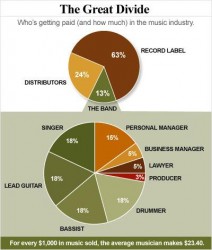Weekly News Roundup (29 January 2012)
Welcome to another edition of the WNR. I hope you’ve had a good week, that the FBI hasn’t stormed your home, seized your prized car collection and that you haven’t had bail denied by a judge. Me? I’ve somehow talked myself into getting a (admittedly cheap) copy of Skyrim (on the PC, of course), despite knowing that I really don’t have the time to play a game that has managed to destroy millions of hours of productivity since it was released. But curious as to what the hype was all about, I talked myself into playing “just a few minutes”. 20 hours of Skyrim later …
Quite a bit to get through, and with the steel ingots and leather strips not making themselves into armor and requiring my urgent attention, let’s get started!

The fallout from the Mega story last week continues, as file hosting websites scramble this week to “clean up” their services, or simply to shut up shop.
This is probably what federal prosecutors, and the content holders urging them to take action, had been hoping for. With thousands of illegal download links now put out of commission, some permanently, it does seem like a major victory in the war against web piracy. Although whether this actually leads to any revenue increases, the whole point behind stopping piracy, time will tell.
For the music industry, this is the second major breakthrough against web piracy in just over a year, along with October 2010’s closure of LimeWire. But it appears that despite what the NPD calculated to be a 46% decline in the number of downloaders shortly after the LimeWire closure, and with less songs downloaded per individual when comparing to the same period a year ago, music revenue for 2011 hasn’t actually increased much at all. In fact, it remains 3% down compared to 2010, when LimeWire (up until October at least) was fully operational. The rate of decline has slowed, but you would think that with such a dramatic decline in piracy rates (nearly half of the people downloading pirated music were using LimeWire to do it just before it was closed down), and the RIAA’s warning of billions upon billions of damage caused by piracy, that it would have at least helped the industry get back into growth. So it will be interesting to see, now that piracy through file hosting services has decreased, what effect it actually has on revenue.

Apparently, only $23 out of every $1000 made on music sales actually goes to the musician, on average (source)
This is of course assuming the main aim behind the targeting of Megaupload was in fact to do with piracy, as it was noted this week that Megaupload was already making plans to take on the music industry head on, in plans that could cause the major labels more damage than piracy ever could. The plan involves a new website called Megabox, which allowed unsigned artists to completely bypass music publishers, and market directly to music fans, with 90% of the revenue going back towards the artist. Even free (ie. pirated) downloads would generate money for the artists, as Megaupload promised to share the very income, earned from downloads, that got them into trouble last week. And if Megabox works, then it would have been a big blow to the majors, and would have seriously questioned their relevance in the age of the Internet, when “naturally” generated hype is more valuable than any kind of promotion that labels could come up with. And with technology enabling artists to sell directly, without having to invest a lot in infrastructure (or they can leave it to tech companies to handle that side of things), artists no longer have to see a majority share of their revenue going to record labels. If there’s one thing the labels fear more than web piracy, it’s this, and while it might require one to be wearing a “tin-foil-hat” to think that this was the only reason behind the Mega take-down, it’s probably a nice little bonus the record industry got out of the whole thing. But while the likes of the RIAA can stop Megabox, they can’t stop innovation and progress, not forever, and a major shift in the way content is packaged, sold and distributed is on its way, if it isn’t here already.
While the Mega stories were very much dominating the headlines, the temporary demise of SOPA was still on people’s minds. One of those minds was EMI’s VP of Urban Promotions, Craig Davis. In a Q&A session with the Reddit horde, Davis expressed largely personal views that seemed to differ quite a bit from the general line of thinking coming out of the music industry these days, in that legislation is the only way forward to deal with the web piracy problem. Perhaps highlighting the internal divisions within the music industry on how to handle the web piracy problem (something we don’t usually get to see, with the RIAA’s loudspeakers drowning out all other opinions), Davis personally opposes SOPA, and says that piracy is more of a service issue, than a pricing one, mirroring what Valve’s Gabe Newell said a few months ago. In fact, Davis specifically mentions Newell as having the right idea when it comes to fighting web piracy. By focusing too much on the pricing issues behind piracy, major content holders often come to the conclusion that there is no real way to “compete” with pirated downloads, as they could not offer their content for free (although I would argue that piracy itself carries a cost, in terms of legal risk, technical and safety issues, and a moral cost, and so for legal content to compete, it does not have to be free, it only needs to be seen as good value). But by concentrating on service, innovation, basically by making legal options more attractive in more ways than just on price, then “legit” could compete with “free”. And perhaps Newell’s Steam could offer guidance to the music, and movie industries as to how to best leverage the positive aspects of the Internet, and how to compete with piracy – Steam’s legendary sales, it’s active community of gamers, and value added features, all help it not only compete effectively with pirated downloads, but also traditional retailers.
But innovation always carries a risk, a risk that, historically, the music and movie industries havn’t been willing to accept. Whenever something new hits the block, whether it’s home audio taping, or VCRs, these industries have resisted change and has tried to sue their way out of the problem. Eventually though, they did accept that change was inevitable, embraced innovation, and has come out better for it. But what’s different this time though is the incredible power lobbyists now hold over elected officials and the systemic corruption in D.C., and this now offers entrenched major content holders another “solution” – to legislate their way out of trouble. Most in D.C. have gotten so used to using money to buy policies, that they no longer sees anything wrong with it. Which is probably why former US Senator, and current MPAA head, Chris Dodd was so transparent in his attack against political opponents of SOPA, literally threatening to stop writing checks for them come election time. That he simply didn’t see any problem with the head of a lobby group threatening to stop paying politicians if a favourable law wasn’t passed, shows just how “comfortable” the Washington crowd has gotten with the way things are done over there (or it may just be because Dodd is stupid). But while Dodd may not have felt that there was anything wrong with his statement, others did, and using the same tactic that has already worked against SOPA, people are signing a new petition on the White House’s “We the People” petition website to ask for a full investigation of Dodd for bribery. With 25,000 signatures required within 30 days for the White House to officially issue a statement on the petition, 30,000 signatures were promptly recorded in just a week (that’s the Internet for ya). The fact that the White House will now have to issue on statement of Dodd’s alleged improprieties, regardless of what the statement actually says, should be hugely embarrassing for the MPAA Chairman. Or it could be much much more serious.

Anno 2070 looks great, but just pray that you don't need to change your GPU, or the game's DRM could lock you out
With so many big issues being discussed, trust Ubisoft to still somehow steal the headlines via yet another incident with one of their controversial DRM choices. When review site Guru3D went about using Ubi’s Anno 2070 in a hardware benchmark test, they found that the 3 PC activation limit also applied when the GPU was changed, and so having barely started their test, they had used up all of their activations. Having calculated that they would need 7 copies, or 21 activations, to finish their testing, Guru3D contacted Ubisoft about this potential “bug” with their DRM, but Guru3D were promptly told that not only was this normal and intentional, Ubisoft wouldn’t be providing the 7 copies needed to finish their testing. So Guru3D did what any self respecting website would have done – they published the entire detail of their ordeal for the Net public to judge, and the expected public backlash eventually forced Ubisoft to back down and allow for GPU changes. Ubisoft came out with the usual statement saying that very few people were affected by this particular problem with their DRM, which is probably true considering the game only came out in November, and I don’t think many would have changed their GPUs twice during this period. But the problem with DRM is that it’s forever, so were Ubisoft really expecting PC gamers, of all people, to not frequently change their GPU or other parts of their hardware? Or maybe they just didn’t think their games were that good for people to be still playing it for more than a couple of month. For now though, while GPU changes are exempt from requiring new activations, other hardware are still being included, and so don’t be surprised if this problem pops up again at a later date.
![]()
And on that note, we move to gaming. For some reason, all the Xbox 720 rumours decided to out themselves this week.
Of course, there cannot be an Xbox rumour without mentioning Blu-ray, and the next Xbox (which I hope will be more imaginatively named than “Xbox 720”) will apparently have a Blu-ray drive. Whether it plays Blu-ray movies or not, remains to be seen though, since the Wii U will have a “Blu-ray like” drive, that won’t play movies.
On the GPU front, a Radeon 6000 series chip might be used. This actually feels too “new” of a chip for a console that’s supposed to be released next year, since the Wii U is only using a Radeon 4000 series. The reason why console manufacturers use older chips, other than the maturity of the product line, is due to the time it takes to engineer an existing off the shelve solution for a game console, the cost involved in using the state-of-the-art GPU, and the fact that optimizations mean console GPUs don’t need to be as powerful as their PC counterparts.
The most controversial rumour involves Kotaku’s reveal that the next Xbox could ban the playing of second hand games. Publishers have long complained that second hand games are cannibalising sales, as gamers can “share” the same copy and game stores profit from each transaction – only one payment from these transactions is made to publishers, right at the start. Publishers have come up with various ways to solve this problem, for example, a voucher system (but that don’t really works for limiting the multiplayer component of games). So if Microsoft really wanted to please publishers, and get them to release more exclusives for the platform, then having a system that ensures second hand games won’t work will do the job. Although I think this will backfire and hurt sales, and the platform, in the long run.
Nothing much more happening this week, at least no in the real non-Skyrim world, so we come to the end of another WNR. See you next week.

